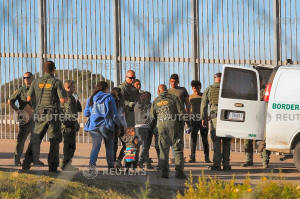|
Many U.S.-bound caravan migrants disperse
as asylum process stalls
 Send a link to a friend
Send a link to a friend
 [December 10, 2018]
By Christine Murray [December 10, 2018]
By Christine Murray
TIJUANA, Mexico (Reuters) - Thousands of
Central American migrants spent weeks traveling north through Mexico in
caravans, walking and hitching rides when possible, only for many to
give up hope and turn back when they met resistance at the U.S. border.
Others hopped the border fence, often directly into the hands of
immigration authorities on the U.S. side, while still others dug in at
temporary lodgings in Tijuana for the long process of seeking asylum
from a reluctant U.S. government.
As rain poured down on a former music venue in Tijuana that holds a
diminished crowd of 2,500 migrants, Jessica, 18, grabbed her feverish
1-year-old daughter and took her inside to a friend while she figured
out what to do with her broken tent.
Jessica had traveled from El Salvador, and said she and her husband were
waiting in the Barretal camp for the right moment to try to cross the
border illegally.
"Getting asylum is really difficult," she said. "They ask you for a lot
of evidence and it's impossible. It's not like they say it is."
Other migrants face the same dilemma. Of 6,000 who arrived in Tijuana in
the caravans last month, 1,000 have scrambled over border fences, and
most of those were detained, the head of Mexico's civil protection
agency David Leon told local media on Wednesday.
A further 1,000 have accepted voluntary deportation, he said, while
others are living on the street outside the municipal sports center
where they first arrived, or in smaller shelters. The director of the
Barretal camp, Mario Medina, said he expected hundreds more to arrive
within days.

U.S. President Donald Trump has sought to make it harder to get asylum,
but a federal court last month placed a temporary restraining order on
his policy that only permitted asylum claims made at official ports of
entry.
Under former President Barack Obama a system dubbed "metering" began,
which limits how many can ask for asylum each day in Tijuana. Lawyers
say Trump is using the system more aggressively to stem the flow at the
port of entry.
A U.S. Customs and Border Protection (CBP) spokeswoman said the agency
works with Mexico and charities to manage the flow, but denied that
people were being prevented from making asylum claims.
Mexico's National Immigration Institute, which did not respond to
requests for comment, has said in the past it protects migrants rights,
while respecting other countries' immigration policies.
Looking after the large groups of Central Americans is a challenge for
Mexico. New President Andres Manuel Lopez Obrador has vowed to issue
more work visas and on Friday pledged to do more to improve conditions
at the Barretal shelter.
His government is in talks with Washington about an immigration plan,
including a U.S. proposal to make asylum seekers stay in Mexico until
their claim is decided, a process that can take years. Some believe that
would deter people from seeking refuge.
NAVIGATING THE LIST
Despite the wait, more people are adding their names to the semi-formal
asylum list. Created a couple of years ago around the time an influx of
Haitians arrived in Tijuana seeking to enter the United States, it has
been challenged in a U.S. lawsuit that claims it deliberately delays
asylum seekers.
[to top of second column]
|

U.S. Customs and Border Protection (CBP) officials detain a group of
migrants, part of a caravan of thousands from Central America trying
to reach the United States, after they crossed illegally from Mexico
to the U.S, as seen from Tijuana, Mexico, December 7, 2018.
REUTERS/Carlos Garcia Rawlins

Migrants put their names in a black-and-white ledger, controlled by
around eight migrant volunteers. Those on the list are given a
number and must wait months to pass through for an interview. The
list contains thousands of names from around the world.
Each day, CBP officials communicate with Mexican immigration
officials who then tell the migrants how many can go through,
according to volunteers, who spoke on the condition of anonymity.
They said between 40 and 100 per day are usually sent.
At the end of each day, Mexican immigration officials guard the
ledger. Lawyers have cited multiple problems with this system. For
instance, they have said, some people on the list could be Mexicans
fleeing the federal government.
Some migrants expressed distrust of the list. Honduran Anabell
Pineda, 26, said she thought the process was not for her as she left
behind a daughter in Honduras.
"They say, though I don't know, that asylum is for people that don't
want to go back to their country, and I do want to go back," she
said.
Pineda, traveling with her son, said that once she gets her
paperwork, she plans find a job in Mexico City.
Pineda has applied for a humanitarian visa that will get her a work
permit in Mexico, a better bet than trying to get to the United
States, she said.
"It's really difficult to cross, because of what happened last time.
I don't want to put my children in danger," she said, referring to
disturbances in which U.S. officials launched tear gas at migrants
last month.

At a jobs fair set up by the federal Labor Ministry, coordinator
Nayla Rangel said more than 3,000 migrants, mainly from the caravan,
had job interviews.
Rangel said there were more than 10,000 jobs open in the state of
Baja California, with salaries around 1500 pesos ($74) per week. For
many migrants hoping to send money to families in Central America,
that likely would not be enough.
(Reporting by Christine Murray; Editing by Daniel Flynn, David
Gregorio and Tom Brown)
[© 2018 Thomson Reuters. All rights
reserved.]
Copyright 2018 Reuters. All rights reserved. This material may not be published,
broadcast, rewritten or redistributed.
Thompson Reuters is solely responsible for this content. |